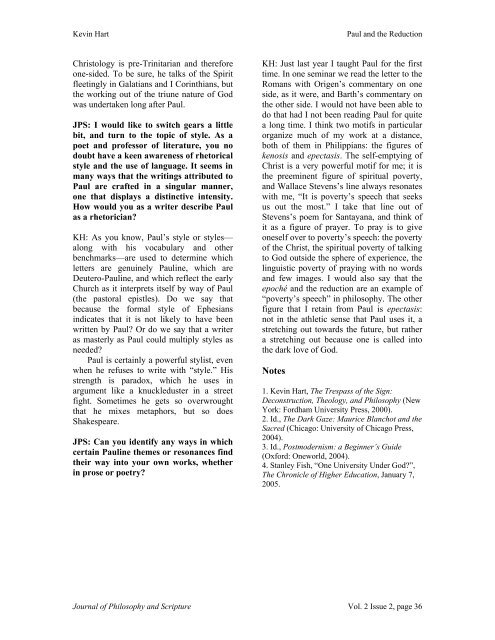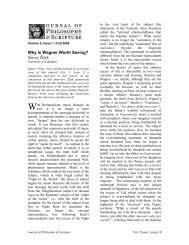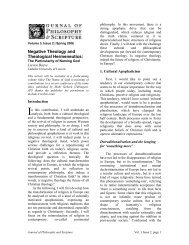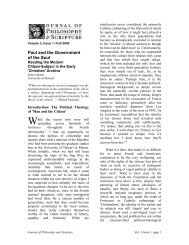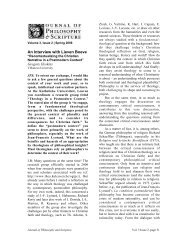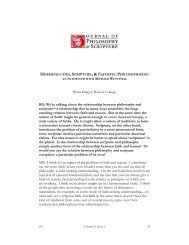An Interview with Kevin Hart - Journal of Philosophy and Scripture
An Interview with Kevin Hart - Journal of Philosophy and Scripture
An Interview with Kevin Hart - Journal of Philosophy and Scripture
You also want an ePaper? Increase the reach of your titles
YUMPU automatically turns print PDFs into web optimized ePapers that Google loves.
<strong>Kevin</strong> <strong>Hart</strong><br />
Paul <strong>and</strong> the Reduction<br />
Christology is pre-Trinitarian <strong>and</strong> therefore<br />
one-sided. To be sure, he talks <strong>of</strong> the Spirit<br />
fleetingly in Galatians <strong>and</strong> I Corinthians, but<br />
the working out <strong>of</strong> the triune nature <strong>of</strong> God<br />
was undertaken long after Paul.<br />
JPS: I would like to switch gears a little<br />
bit, <strong>and</strong> turn to the topic <strong>of</strong> style. As a<br />
poet <strong>and</strong> pr<strong>of</strong>essor <strong>of</strong> literature, you no<br />
doubt have a keen awareness <strong>of</strong> rhetorical<br />
style <strong>and</strong> the use <strong>of</strong> language. It seems in<br />
many ways that the writings attributed to<br />
Paul are crafted in a singular manner,<br />
one that displays a distinctive intensity.<br />
How would you as a writer describe Paul<br />
as a rhetorician?<br />
KH: As you know, Paul’s style or styles—<br />
along <strong>with</strong> his vocabulary <strong>and</strong> other<br />
benchmarks—are used to determine which<br />
letters are genuinely Pauline, which are<br />
Deutero-Pauline, <strong>and</strong> which reflect the early<br />
Church as it interprets itself by way <strong>of</strong> Paul<br />
(the pastoral epistles). Do we say that<br />
because the formal style <strong>of</strong> Ephesians<br />
indicates that it is not likely to have been<br />
written by Paul? Or do we say that a writer<br />
as masterly as Paul could multiply styles as<br />
needed?<br />
Paul is certainly a powerful stylist, even<br />
when he refuses to write <strong>with</strong> “style.” His<br />
strength is paradox, which he uses in<br />
argument like a knuckleduster in a street<br />
fight. Sometimes he gets so overwrought<br />
that he mixes metaphors, but so does<br />
Shakespeare.<br />
JPS: Can you identify any ways in which<br />
certain Pauline themes or resonances find<br />
their way into your own works, whether<br />
in prose or poetry?<br />
KH: Just last year I taught Paul for the first<br />
time. In one seminar we read the letter to the<br />
Romans <strong>with</strong> Origen’s commentary on one<br />
side, as it were, <strong>and</strong> Barth’s commentary on<br />
the other side. I would not have been able to<br />
do that had I not been reading Paul for quite<br />
a long time. I think two motifs in particular<br />
organize much <strong>of</strong> my work at a distance,<br />
both <strong>of</strong> them in Philippians: the figures <strong>of</strong><br />
kenosis <strong>and</strong> epectasis. The self-emptying <strong>of</strong><br />
Christ is a very powerful motif for me; it is<br />
the preeminent figure <strong>of</strong> spiritual poverty,<br />
<strong>and</strong> Wallace Stevens’s line always resonates<br />
<strong>with</strong> me, “It is poverty’s speech that seeks<br />
us out the most.” I take that line out <strong>of</strong><br />
Stevens’s poem for Santayana, <strong>and</strong> think <strong>of</strong><br />
it as a figure <strong>of</strong> prayer. To pray is to give<br />
oneself over to poverty’s speech: the poverty<br />
<strong>of</strong> the Christ, the spiritual poverty <strong>of</strong> talking<br />
to God outside the sphere <strong>of</strong> experience, the<br />
linguistic poverty <strong>of</strong> praying <strong>with</strong> no words<br />
<strong>and</strong> few images. I would also say that the<br />
epoché <strong>and</strong> the reduction are an example <strong>of</strong><br />
“poverty’s speech” in philosophy. The other<br />
figure that I retain from Paul is epectasis:<br />
not in the athletic sense that Paul uses it, a<br />
stretching out towards the future, but rather<br />
a stretching out because one is called into<br />
the dark love <strong>of</strong> God.<br />
Notes<br />
1. <strong>Kevin</strong> <strong>Hart</strong>, The Trespass <strong>of</strong> the Sign:<br />
Deconstruction, Theology, <strong>and</strong> <strong>Philosophy</strong> (New<br />
York: Fordham University Press, 2000).<br />
2. Id., The Dark Gaze: Maurice Blanchot <strong>and</strong> the<br />
Sacred (Chicago: University <strong>of</strong> Chicago Press,<br />
2004).<br />
3. Id., Postmodernism: a Beginner’s Guide<br />
(Oxford: Oneworld, 2004).<br />
4. Stanley Fish, “One University Under God?”,<br />
The Chronicle <strong>of</strong> Higher Education, January 7,<br />
2005.<br />
<strong>Journal</strong> <strong>of</strong> <strong>Philosophy</strong> <strong>and</strong> <strong>Scripture</strong> Vol. 2 Issue 2, page 36


